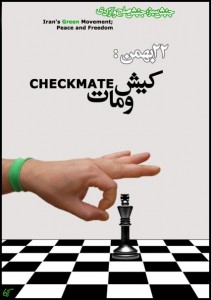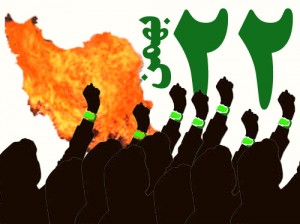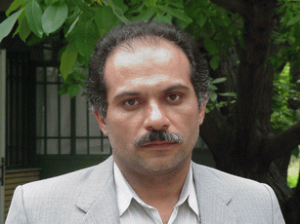
2155 GMT: Kalemeh reports that the wife of the late Seyed Ahmad Khomeini, the son of Ayatollah Khomeini,
has been attacked by clerical students.
1905 GMT: Economic Rumour or Reality (cont. --- see 1135 GMT)? The "bank crisis" continues to spark Internet chatter, whether accurate or mischievous --- the German-based
Akhbar Rooz reports on bank closures after panicked customers tried to withdraw their money because of reports of bankruptcies. And Voice of America Persian is now broadcasting on the topic.
Iran Discussion: How Would Ahmadinejad Fall? (And What Would Come Next?)
Iran: A Response to “The Plot Against Ahmadinejad”
UPDATED Iran: The Plot Against President Ahmadinejad
The Latest from Iran (22 January): Breaking News
1900 GMT: You Couldn't Make It Up (Unless You're Iranian State Media). Earlier this week
Kayhan, the "hard-line" Iranian newspaper, reported that a US "HARP" energy-shifting weapon caused the earthquake in Haiti.
We noted the item in amazement and good humour --- as a reader noted, shrewd Iranians think of
Kayhan as Iran's version of
The Onion, the satirical US "newspaper" --- and thought that would be that. However, Press TV, linking up with Venezuelan partners,
keeps the joke going today:
An unconfirmed report by the Russian Northern Fleets says the Haiti earthquake was caused by a flawed US Navy 'earthquake weapons' test before the weapons could be utilized against Iran.
United States Navy test of one of its 'earthquake weapons' which was to be used against Iran, went 'horribly wrong' and caused the catastrophic quake in the Caribbean, the website of Venezuela's ViVe TV recently reported, citing the Russian report.
1845 GMT: Arrest at Beheshti Ceremony. Norooz reports that the son-in-law of Ali Reza Beheshti, the detained Mousavi chief of staff,
was taken away by Iranian authorities today. The arrest occurred at the protest/ceremony (see 1500 GMT) at the grave of Ayatollah Beheshti, Ali Reza's father.
1635 GMT: Rafsanjani Chooses A Side or Issues a Warning? The
Los Angeles Times, via Iranian Labor News Agency, reports on
remarks by Hashemi Rafsanjani today: "At the present juncture, I consider the Supreme Leader to be the most competent individual to resolve the problems the Islamic Republic is currently faced with."
Rafsanjani's remarks follows Ayatollah Ali Khamenei's speech this week calling on "elites" to stop being ambiguous in the current conflict and to choose sides. Beyond his apparent declaration of allegiance --- note the "at the present juncture" --- Rafsanjani maintained a customary general call for unity, "I'm quite sure that moderate individual from both political camps in the country can help the Supreme Leader find solutions to the existing problems."
Then, however, Rafsanjani offered some intriguing remarks on "extremism":
I've always based my action on moderation and refrained from any extremism. Since the victory of the revolution, we have not witnessed proper conditions any time extremists were given room to maneuver....
Extremists have always cleared the way for counterrevolutionaries to damage Islam, the regime and its leadership. As far as I know (emphasis added) the Supreme Leader, he never favors illegal acts and extremisms from any political factions.
Rafsanjani followed this with an invocation which could be read either as a defense of velayat-e-faqih (clerical supremacy) or a veiled put-down that Ayatollah Khamenei has not maintained the high standards required of his position:
The Islamic Republic has managed to reach stability thanks to popular support and the leadership of Imam [Ruhollah] Khomeini who won people's hearts. Today, all forces loyal to the system and the revolution should feel obliged to safeguard this valuable legacy. The world will open to us if we effectively create a free and developed country free of any superstition.
1630 GMT: Fars News has posted an article on
today's trial of three detainees arrested during the Ashura protests. The three are among five defendants who are on trial; all today were accused of links to the Mujahedin-e-Khalq (MKO).
1623 GMT: Neda's Birthday Ceremony. Setareh Sabety translates the account, provided by an Iranian activist (see 1500 GMT), of
today's ceremony on the birthday of Neda Agha Soltan:
Near 2 p.m. we reached plot 257, Neda’s grave was adorned with candles, rose petals and pictures of her childhood. From the first moments...plainclothesmen in cars and on motorcycles started surrounding the plot.
Neda’s mother claimed (Iranian authorities) had not allowed her to hold a 40th day memorial for her daughter so she had to commemorate her birthday instead. The previous day authorities had told Neda’s brother that holding a birthday (celebration) for her was allowed as long as no slogans were chanted.
Slowly the number of people attending the ceremony increased. Present were mourning mothers and their supporters and tens of (other) individuals who had made it to the cemetery. When Neda’s mother saw the people appearing one by one, as she was crying loudly, she addressed her martyred daughter, "Neda darling, wake up and see how many guests are here for you. Last year you were alone. Wake Up!” The distraught mother would sometimes sit by her daughter’s grave and stare at it, remembering her.... It seemed like the people surrounding this mother and her daughter’s tomb were remembering Neda’s last open-eyed look. The look that seemed to scream freedom!
Neda’s birthday cake was placed on her tomb with a ‘27’ on it, while her mother cried, “My darling Neda is twenty-seven, People’s Neda is 27 years old." As the crowd increased around 2:45 p.m., two cars from security forces stood facing plot 257. The security forces stepped out with three plainclothes men --- Neda’s aunt was taking pictures of the tomb when the forces spoke to Neda’s father and asked to see the pictures in Neda’s aunt’s mobile phone.
Ashkan Sohrabi’s mother called and (said) that on Navab St. officers stopped cars and kept them from going to Behesht-e Zahra cemetery. For as long as 15 minutes they had prevented Ashkan’s family from moving. Finally they managed to get to Behesht-e Zahra from another route.
At the end of the commemoration the Mourning Mothers stood in front of Neda’s tomb and quietly sang this poem from Parvin:
You left my heart is heavy
From the night you did not return
Blissful world turned sad
From the night you failed to return
At 3:25 p.m. an unmarked white van stopped in front of plot 257 and a few plainclothes men came out as though to make the crowd disperse.
1610 GMT: Radio Farda reports that, during today's meeting with the family of Ali Reza Beheshti after the ceremony protesting his detention (see 1500 GMT),
Mehdi Karroubi declared that the road to resolve the issue of detainee abuse "had been closed".
It is unclear whether Karroubi's statement was in response to the overtures from Ali Larijani (see yesterday's updates) for opposition leaders to join a process of reconciliation.
1505 GMT: Amidst his further allegations of Government abuses and crimes over the Kahrizak Prison scandal (noted as part of
the coverage of "The Plot Against Ahmadinejad"),
Abdolhossein Rumolamini claimed that a fourth detainee, Ramin Aghazadeh Ghahremani, was killed at the facility last year. The incident was covered up to “avoid hurting the public's conscience”.
1500 GMT: Two Ceremonies. Family, mourning mothers, and supporters gathered at the grave of Neda Agha Soltan this afternoon. Activists report that
security forces stopped some people from attending.
A ceremony was also held
at the grave of the late Ayatollah Mohammad Beheshti to protest the detention of his son Ali Reza, chief advisor to Mir Hossein Mousavi. Those attending were family members of the martyrs of 7-Tir, killed in an attack soon after the 1979 Revolution which took 72 lives, including Ayatollah Beheshti. The family members also Hashemi Rafsanjani, in his role as the head of the Expidency Council and the Assembly of Experts, to protest Ali Reza Behesti's imprisonment.
1300 GMT: We have
posted an urgent update in "The Plot Against Ahmadinejad": a new interview with Abdolhossein Ruholamini with claims on the Kahrizak Prison deaths, printed in the newspapers linked to both Mohsen Rezaei and Mohammad-Baqer Qalibaf.
1235 GMT: Alef News has continued its pressure on the Government,
opening a discussion on the problems of the Presidential election.
1225 GMT: Mohammad Hassan Haeri Shirazi, the son of Ayatollah Haeri Shirazi, has continued his challenge to the Supreme Leader. Having criticised Khamenei for overseeing a deterioration of democracy and the moves to an oppressive regime, Haeri Shirazi
has declared that the Supreme Leader must be accountable for the actions of his headquarters and associated institutions (IRIB, Revolutionary Guards and Basiji, Islamic Propaganda Organization, deputies in universities, Kayhan newspaper, and the Guardian Council).
1150 GMT: Health Concerns. In addition to the heart attack of Mousavi advisor Ali Reza Beheshti,
Rooz Online notes the
transfer to hospital of Hassan Ahmadian, head of the Mousavi campaign's public committee, because of a worsening kidney condition.
1145 GMT: The 31 Manifesto (cont. --- see 0845 GMT).
Rooz Online has an English translation of
an interview with Dariush Ashouri, one of the expatriate intellectuals who signed this week's declaration: "The Green movement’s strategy of nonviolence is a reflection of a new political philosophy in Iranian society. The foundations of this philosophy are the principles of tolerance and pluralism."
1135 GMT: Economic Rumour or Reality? After chatter this week that Iran's major banks are on the verge of insolvency,
Peyke Iran reports that the Bank-e Mellat branch in Tehran's Bazaar was closed by security forces. And
Rah-e-Sabz writes that the Government
has asked Parliament for 15 billion Toman ($15.2 million) to ease the cash problems of the banks.
1125 GMT: Mediawatch (2). Britain's Channel 4 goes for human interest rather than political recommendation, featuring
an interview with Caspian Makan, the fiancé of Neda Agha Soltan. Neda, who died from a Basiji gunshot on 20 June, would have been 27 today.
1010 GMT: Mediawatch. A big symbol of the changing line in the US Government and associated networks towards the Green movement comes in Richard Haass'
"Enough Is Enough" for Newsweek, as he explains, "Why we can no longer remain on the sidelines in the struggle for regime change in Iran".
Haass, who was a high-level official in the State Department in the Bush Administration and now heads the Council on Foreign Relations, marks himself out as a "realist" in the artificial divide from "neo-conservative".
However, given the stalemate in the talks on Iran's nuclear programme, Haass now believes, "The United States, European governments, and others should shift their Iran policy toward increasing the prospects for political change. Leaders should speak out for the Iranian people and their rights."
Given Haass' place in the Washington-New York corridor of power and his image as a "moderate", the column is being quickly picked up as a sanction for the US Government's backing of the Iranian opposition. Barbara Slavin of
The Washington Times and Laura Rozen of
Politico, both channels for and gatekeepers of the acceptable in US foreign policy, are already
circulating the article.
0955 GMT: The Moving Image of Protest. More directors, including Britain's Ken Loach, have announced that they
will not attend Iran's Fajr Film Festival.
0950 GMT: Launch of the "Greenlist".
Sabzlist, a listing service for the Green movement,
has been launched. Initial posts include requests for volunteers, offers of assistance, and a call for an MC for a fundraiser.
0940 GMT: Non-Story of the Week.
Press TV's website announces, "An Iranian lawmaker says the Parliament (Majlis) has settled on limiting relations with Britain, rather than a full severance of ties as advocated in a bill last week."
The bill, if passed, would still have consequences, reducing the level of diplomatic representation between Iran and Britain from Ambassador to Chargé d'Affaires. However, it is primarily a vehicle for bluster about "foreign intervention", as in lawmaker Hossein Sobhani-Nia's declaration, "Considering the gross interference of the British government in the post-election developments, the Parliament (Majlis) has opted for lowering the level of ties between Tehran and London."
0830 GMT: Claims of the Week.
Peyke Iran has two stories which raises eyebrows. The first asserts that the relatives of high-ranking officials
are fleeing Iran and seeking asylum abroad.
The website also alleges that
children are now being detained when their activist parents are arrested by Iranian authorities.
0825 GMT: The 31 Manifesto. This week's statement by 31 Iranian intellectuals and artists, calling for a new system in which government is separated from religion, continues to attract attention.
Deutsche Welle Persian features
an interview with signatory Hossein Bagherzadeh, who declares that the Green movement differs from the 1979 Revolution.
0820 GMT: Movin' On Up. President Ahmadinejad's advisor on press affairs, Ali Akbar Javanfekr, is reportedly going to become t
he head of the Islamic Republic News Agency.
0815 GMT: A new Green website,
Neda-ye Sabz-e Azadi,
has been launched and has immediately been filtered by Iranian authorities.
0800 GMT: We begin this morning by reviewing yesterday's feature on "The Plot Against President Ahmadinejad". There is
an update evaluating how the story stands up 24 hours later, and Chris Emery and an EA Iran specialist
consider the complications of removing the President and what comes next.
 Thursday, January 28, 2010 at 2:00
Thursday, January 28, 2010 at 2:00  New EA correspondent Elham Gheytanchi writes:
New EA correspondent Elham Gheytanchi writes:




